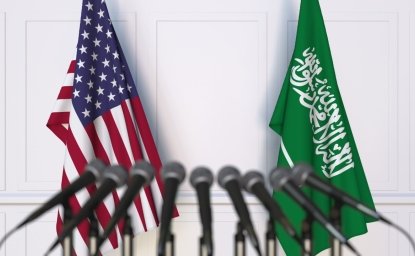Russia’s invasion of Ukraine has created a major international oil crisis that is forcing President Biden to consider seriously abandoning his presidential campaign promise to render Saudi Arabia’s Crown Prince, Mohammed bin Salman, a pariah in Washington. This was the penalty he imposed on the kingdom’s de facto ruler for his involvement in the 2018 murder of Saudi journalist Jamal Khashoggi, who had become his foremost critic as a Washington Post global opinion writer.
The dilemma pits Biden’s commitment to promoting democracy and combating the rising tide of autocracy against the realpolitik of soaring gasoline prices before November congressional elections and the imperative to wean Western Europe off dependence on Russian oil and gas.
Saudi Arabia has the world’s largest reserve oil production capacity, two million barrels per day, and is the only producer capable of making any dent in the price of gasoline for American consumers. Furthermore, the kingdom is expanding its production capacity by one million barrels a day, more than a third of Russia’s current exports to Western Europe which the Biden administration seeks to block.
Biden should consider carefully beforehand what MBS might be willing or capable of delivering as a quid pro quo for abandoning his “pariah policy.”
Biden should consider carefully beforehand what MBS, as the crown prince is called, might be willing or capable of delivering as a quid pro quo for abandoning his “pariah policy.” He has not even spoken on the phone to the crown prince since taking office 15 months ago or appointed a new American ambassador to the kingdom.
He should also consider the possible damage his embrace of the crown prince would inflict on his own image and other policies. If he did so, he would appear to be accepting MBS’ ever more dictatorial rule, and it would make a mockery of his commitment to promoting democracy and human rights worldwide. It might well also drag his administration deeper into the Saudi Iranian rivalry for regional primacy.
These costs might be worth it. In the best-case scenario, MBS agrees to produce significantly more oil, withdraw from the Yemen war, recognize Israel, and accept accommodation with Iran. The central question posed today is whether MBS is willing or capable of changing his current policies on any of these pressing issues.
On the first count, there has been no indication of Saudi willingness to break the agreement the 13-member Organization of Petroleum Exporting Countries struck with Russia and nine other non-OPEC producers, to only increase production collectively by 400,000 barrels a day each month. This line essentially depends on MBS and Russian President Vladimir Putin, leaders of these two groups, holding fast. So far, they have decided to milk the present supply shortage to maintain the highest prices possible.
The seven-year-long Yemen civil war has become an albatross MBS has little prospect for lifting from his shoulders. There has been no progress on multiple UN and US diplomatic efforts to negotiate a diplomatic settlement. A Saudi unilateral withdrawal would leave Iranian-backed Houthi rebels in control of the capital, Sanaa, and all of northern Yemen bordering the kingdom. Iran would be in Yemen to stay. This prospect is intolerable to the crown prince.
On Israel, the Trump administration did its best but failed, to convince MBS to establish diplomatic relations with the Jewish state when four other Arab states (the United Arab Emirates, Bahrain, Sudan, and Morocco) did so in 2020. MBS has said he regards Israel as “a potential ally” but that “some issues” must be resolved first—apparently a reference to the Palestinians. No progress has been registered on Israeli-Palestinian talks in years, and none seem imminent.
In Congress, many Republicans and Democrats alike would raise a hue and cry if Biden resumed US military support for the Saudi-led Yemeni venture.
MBS’s two “asks” of the Biden administration are to re-impose the US branding of the Houthis as a terrorist organization and renew military assistance to help his forces defeat them on the battlefield. Biden lifted Trump’s terrorist designation and cut off offensive US arms for the Saudi war. US relief groups say his acceding to the first ask would block their delivery of desperately needed humanitarian aid to the population living in Houthi-held territory. In Congress, many Republicans and Democrats alike would raise a hue and cry if Biden resumed US military support for the Saudi-led Yemeni venture.
MBS also opposes the Biden administration’s policy of reviving the nuclear deal with Tehran from which Trump withdrew in 2018. It would at least delay Iran’s perceived drive to build a nuclear bomb but do nothing to tackle the Iranian missile threat to the kingdom. This has become the kingdom’s primary concern ever since Iran’s missile-and-drone attack on two Saudi oil facilities in September 2019 that knocked out half the kingdom’s production. Trump’s justification for not retaliating against Iran was that he saw no US interest at stake.
Biden has committed his administration to keeping Iran from building a nuclear bomb and expanded US support for Saudi Arabia’s anti-missile defense system against Iranian projectiles. But he has not even hinted the United States might retaliate in case of another Iranian missile attack on the kingdom.
There is obviously no love lost, or even to be gained, between these two leaders who won’t even speak to each other. But it is questionable as well whether even realpolitik would suffice to unlock their deadlock. Both seem short on deliverables to make even a bare-boned transactional deal attractive to each other.
The views expressed in these articles are those of the author and do not reflect an official position of the Wilson Center.
Author

Former Washington Post Middle East Correspondent

Middle East Program
The Wilson Center’s Middle East Program serves as a crucial resource for the policymaking community and beyond, providing analyses and research that helps inform US foreign policymaking, stimulates public debate, and expands knowledge about issues in the wider Middle East and North Africa (MENA) region. Read more

Explore More
Browse Insights & Analysis
Biden’s Saudi Oil Dilemma

Israel Escalates Attacks in Gaza: What’s Next?




